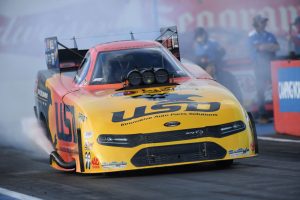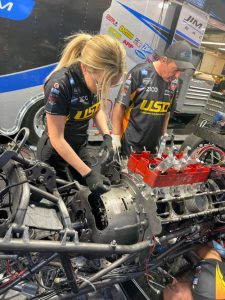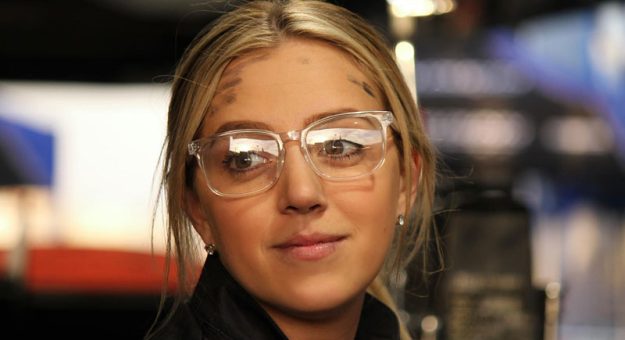When Johnna Dunn was growing up, crew members from her family’s Jim Dunn Racing team helped her with her math and science homework on airplanes, in rental cars and in hotel lobbies near whatever drag strip the team was competing at that weekend.
The image of mechanics poring over algebra problems is a snapshot of both the unexpected intricacies of life on the road and the ever-present role of drag racing in Dunn’s life. Yet, while she was born into the sport, Dunn is charting her own path in NHRA racing, while also taking on daily challenges as an emergency room first responder.
“There are not a lot of days off,” she said. “I might have one day off in the week and that’s kind of my catch-up day to do laundry and everything, and pack again for the next weekend.”
Dunn, 24, is the granddaughter of legendary racer, tuner and team owner “Big Jim” Dunn. His career has spanned more than 70 years and he was immortalized in the 1974 film “Funny Car Summer.” Johnna Dunn’s father is Jon Dunn, who works on the team’s Dodge Funny Car in addition to serving as the team manager. Her uncle is Mike Dunn, a winner in the NHRA TopFuel and Funny Car categories, as well as a longtime TV analyst.
For Johnna Dunn, who works on clutches for her family’s Funny Car driven by Jim Campbell in the NHRA Camping World Drag Racing Series, it was always obvious she was going to be part of the sport.
“I didn’t really have a choice because my whole family’s involved in it,” she said. “I’ve been going to the track ever since I was in diapers. As I got older, I kind of messed around and I would roll around in the big Goodyear tires down the pit lanes. So, I got my hands dirty here and there.”
As the years progressed, her grandfather, whom she calls “Papa,” began giving her small assignments: greasing pistons and rods, brushing off the tires, wiping down the car. “He just gave me little tasks,” Dunn said. “That grew my interest and love for the sport because I could see him doing what he loves to do, my father doing what he loves to do, my uncle (was) in the tower, my grandmother (Diane) does the fuel for the race car and mixes the nitro. I knew that I wanted my job on the car.”
Dunn is originally from Long Beach, Calif., and today lives in Norco, putting her squarely in the region of the country where drag racing first took hold when her grandfather was a young man. The race team’s shop is in nearby Ontario.
Dunn also has a close relationship with her father, whom she calls “Pop.” It was by watching his work as a clutch specialist that she developed an interest in working on clutches, a role that is less based in routine than others on the team.

“As I got older, I observed my dad a lot; I liked what he was doing and it was a very meticulous job,” she said. “Each time that he put the clutch together he was making changes and I liked that. He was working hand in hand with my grandpa, looking at the numbers and figuring out the car.”
Dunn first asked if she could work as a clutch assistant and is slowly transitioning into her father’s main clutch specialist role. This year, she has gained more responsibility with building clutch packs, grinding discs and adjusting weight for the team’s five-disc clutch setup. She also handles social media and PR for the company. It was her first job out of high school on the team when she was 17 and gives her an inside look at the business side of the sport.
Jim Dunn Racing is a single-car operation that has become a beloved underdog in NHRA thanks in large part to its longevity. Dunn’s passion for drag racing is apparent, but she also has a separate life in health care, which she talks about with the same devotion. In fact, she received an award for compassion from her hospital, St. Jude Medical Center in Fullerton, as part of its Values in Action program.
While it’s not uncommon for those in drag racing to work other jobs, few are seemingly as different as Dunn’s vocations. Still, she sees multiple similarities between her work with the medical emergency response team and the intensity of the race track.
“I relate the chaos of the emergency room to when we come back to the pit on Sunday and we’re thrashing between rounds,” she said. “When we have a code that comes in (at the hospital), we have a code team and I’m part of that. Everybody on that code team has a specific job to address the patient and make sure that the patient is safe in the long run. For the car, everybody on the team has a specific role to get the job done so we can get up there and go for second round. I think it’s just about working with the team. The team aspect in both areas of my job is pretty similar actually.”
Dunn always knew she wanted to make a positive impact and first went through the police academy, but ultimately pursued the medical route. She has been at the hospital for a handful of years and is also currently furthering her education to become a certified registered nurse anesthetist.
In the emergency room, she is often one of the first people to address a variety of life-threatening conditions. She usually works either 12- or 17-hour shifts two times early in the week and then travels with the race team Thursday through Sunday.
Dunn began in the emergency room just prior to the height of the pandemic, giving her a front-row seat to the once-in-a-lifetime crisis. “It’s always craziness in the ER and especially this last year with COVOD,” she said. “I mean we had the tents out in the parking lot, we had to make new COVID areas for the ER, we were wearing all of our PPE gear, everybody was on a ventilator, so it was almost like working through a war zone.”
Dunn, who considers herself a strong person emotionally, often found herself in tears watching numerous people die in front of her, with family members forced to FaceTime with loved ones to say goodbye. In addition to the emotional pain of being surrounded by death and refrigerator trucks outside, the physical toll of constant exhaustion also affected Dunn and numerous other health care workers.

As a result, she embraced the chance to go racing with her team.
“Racing was almost my safe zone,” she said. “It was where I could get a fresh breath of air during the year. During the week I was emotionally and physically just beat. I was so tired. I was coming home and I was just in tears after my long day of 12 to 17 hours. Then you’re wearing your PPE gear all day as well, so you’re sweating, and you’ve got lines on your face because theN95s are digging into your skin. When we were going out of town for a race…It was nice to be able to get away and kind of have that stress-free weekend.”
At the track, however, Dunn often faced those who doubted the severity of COVID, or those whose response to guidelines and restrictions didn’t relate to what she was seeing.
“It was a hard adjustment, but in the racing world we’re a big family,” Dunn said. “So, (people will) ask me what it’s like in the hospital. A lot of the crew guys would ask me how it’s been, what are the numbers like, how are my patients doing.”
She never minced words, providing context from what she saw firsthand. When NHRA national events returned at Lucas Oil Indianapolis Raceway Park in the summer of 2020, the Jim Dunn Racing team and sponsor Cattleman’s Cut Beef Jerky featured a wrap with the nose of the car wearing an American flag mask and a message saluting first responders.
The scheme was unknown to Dunn when it was in the works, and she brought hero cards to her co-workers as a small token of appreciation. Over the last few seasons, Dunn has become one of the most recognizable figures in the NHRA pit area and is often asked for autographs. She is one of the team’s most popular members.
Her Instagram following is constantly on the rise, and she’s taken on some modeling roles for sponsors and various other projects. “I’m getting a bunch of people reaching out to me and asking me questions and they’re saying that they’re fans of me, which is amazing, it’s outstanding,” Dunn said. “I think it’s just because I’m young, I’m a female living in a man’s world out here and I just adapt really well. I think it’s just because I was brought up into the sport.”
Dunn did some Super Comp racing when she was 16 and soon plans to get her license to carry on the family tradition behind the wheel of a nitromethane-powered Funny Car. She’s warmed up the car on several occasions and will spend much of this year soaking up knowledge about the vehicle’s mechanics from her teammates and family, valuable teachers as she forges ahead in the sport.
It’s a unique life, but one which Dunn has thoroughly embraced. “Every weekend is truly a blessing,” she said. “It’s just a lot of great memories over the years.”
That even goes for the math and science homework.
